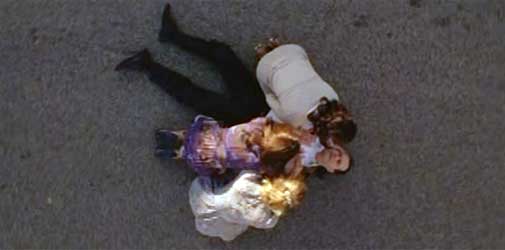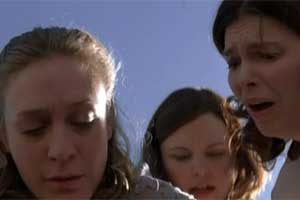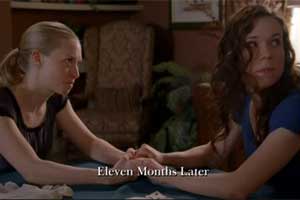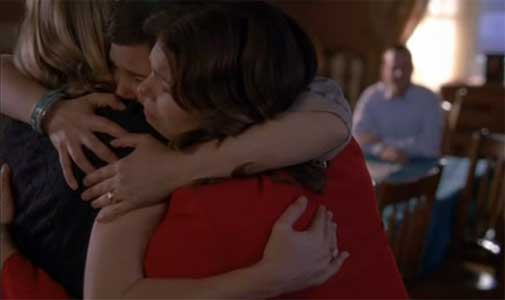
HBO's Big Love ended Sunday night, with an expanded episode that is repeated Monday at 10 ET on HBO2. If you've already seen it, read on past the jump. If not, and don't want the details revealed and discussed, stop right here, and come back to this column once you've done your homework.
But once again, for the record, the newsman in me resents having to wait for the slowpokes. If a show's finale means that much to you, watch it live...
HBO's most famous dramatic series, The Sopranos, ended, inventively and infamously, with the opposite of closure -- by just cutting to black and stopping in mid-scene. Six Feet Under, by contrast, took its death-and-afterlife themes seriously by providing a final postscript that traveled years and decades into the future, showing us the fates, and deaths, of every major character.
Big Love, which ended its five-year run Sunday, went out more like the latter than the former. After an unexpected climax, the final episode propelled its plot 11 months into the future, to give viewers a peek of life after death -- specifically, the death of its central protagonist.
And here, after this one final warning, come the specifics...
Series creators Mark V. Olsen and Will Scheffer wrote the finale, and their obvious aim was to defy expectations. To wit:

-- After setting up one deadly adversary after another to confront Bill Paxton's Bill Henrickson, the finale had him shot and killed -- but by a randomly reintroduced and suddenly unhinged neighbor. Bill was shot outside his home, and his three wives ran out to hover over him angelically, and even instill a blessing, as he died.
-- After spending the entire season pulling Bill and his three wives apart, the finale had them banding together. And, after Bill's death, not only carrying on without their polygamist patriarch, but reuniting the extended family, carrying on Bill's church (with his eldest widow, Jeanne Tripplehorn's Barb, now in the pulpit), and returning the next generation to the family fold.

-- The postscript, with its "11 months later" identifier, made room for the return of Bill's daughter, Sarah (played by Amanda Seyfried, now of the movie Red Riding Hood) and her husband (Aaron Paul, now of AMC's Breaking Bad), back to have their baby boy named after his grandfather. Bill's son also has found happiness, winning the heart of the young woman who had been wary of his family history, and Bill's three wives, on their own, were supporting one another lovingly.
There was only one blot on the otherwise happy ending. As Bill's youngest wife, Jinnifer Goodwin's Margene, tells her sister wives, "It breaks my heart that he wasn't here to see this day." The communal widows embrace by the family dinner table, and the camera pans around them. Out of focus in the background, sitting at his usual place at the head of the table, is Bill, at least in spirit form -- witness to it all, as are we.
Here's a freeze-frame of that image:

It might have been a bit too pat, but certainly, it was an ending that affirmed belief in both faith and family, which not many suspected as the agenda of Big Love when it premiered.
And finally, one last point.
Inarguably, Bill's death gave new resonance to the lyrics of "God Only Knows," the show's Brian Wilson-penned theme song. Heard for one final time, it seemed to be coming from a much more ethereal perspective.
So what do YOU think about the way Big Love ended? Emotional conclusion, satisfying wrap-up, or clunky cop-out?